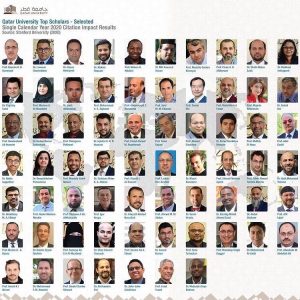
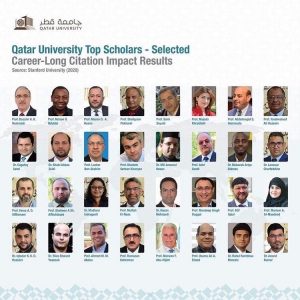
Home » Achievements » Research (Page 4)
October 19, 2022 / Leave a comment
A CSE team of undergraduate students, supervised by our faculty member Dr. Noora Fetais, won the Best Presentation award in the 14th Annual Undergraduate Research Experience Program (UREP) competition, which was held on 18th of October 2022. The winning project is titled “Intelligent and Immersive Cultural Game using Virtual Reality” and the team consists of the students Yahia Boray, Hesham Zaky, and Omar Osman.
UREP is one of the main programs offered by Qatar National Research Fund (QNRF) and designed to fulfil its aims in developing research infrastructure in Qatar by establishing the basis of scientific research at the undergraduate level. UREP provides a great opportunity for undergraduate students to experience scientific research and to engage in the various processes to build skills essential for the professional development of the students.
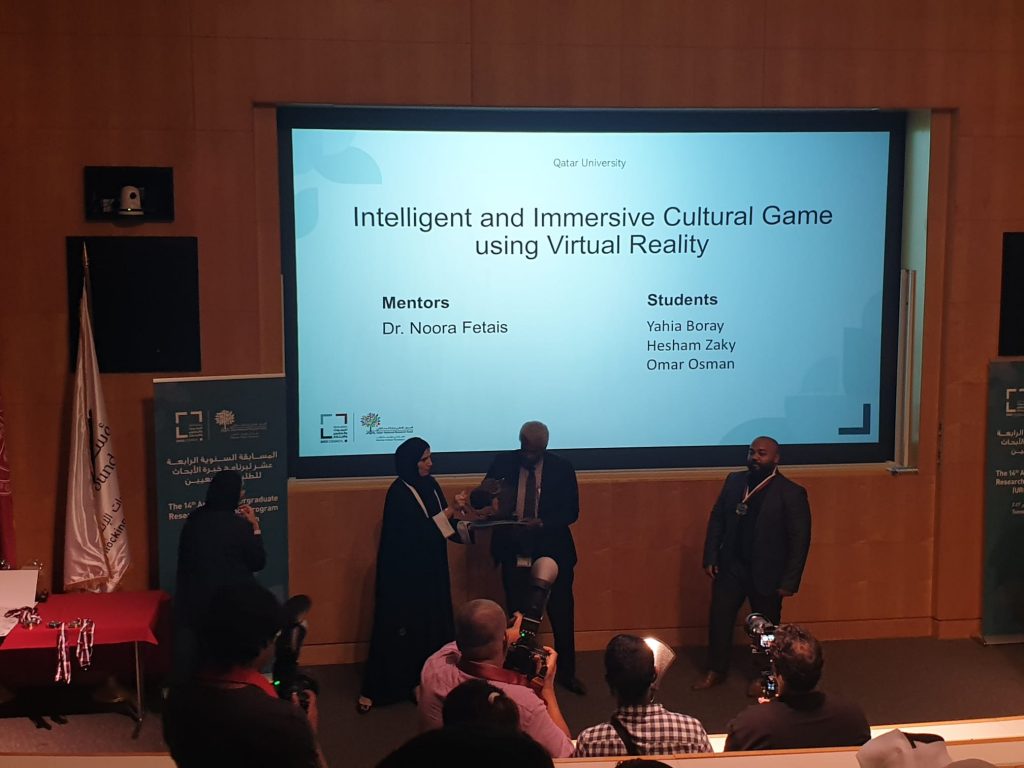
The developed game aims to preserve and spread cultural practices. It introduces new gaming mechanics, allowing user interaction with virtual game objects using hand gestures. The user’s objective is to hunt prey in their natural habitat which means that the player will physically change his location to hunt a specific prey using his falcon to mimic how the falcon hunts for its’ prey in the real world. This interaction with the real world, along with the incorporation of realistic graphics and mixed reality features, enhances the user’s experience and helps in preserving cultural practices.
Previous work tried to achieve the same goal by different approaches that led to different user segments and different usability cases. One major limitation in that work was the accessibility due to the use of specialized hardware. The hardware is accessible to only a small segment of users, and due to the challenges forced by the COVID19 situation reusing the hardware is prohibited in conferences or exhibitions.
As a result, not many will have access to the developed solution. The new implementation was designed to work on both Android and IOS to have a social interaction between the largest possible numbers of players. Other features that could also contribute to the goal of the project include building a virtual museum and displaying real falcons using the capabilities mixed reality has to offer.
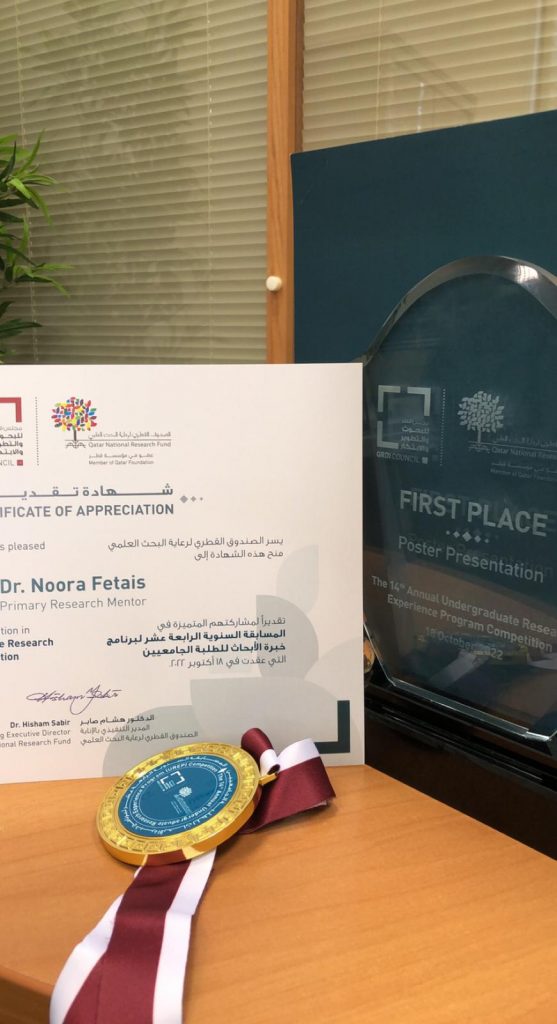
Congratulations to the winning team!
October 10, 2022 / Leave a comment
Faculty members and students from CSE department have received awards in QU Annual Research Forum and Exhibition 2022. The event brought together students, researchers and academics from the University’s colleges, research centers and institutions, in addition to partners and stakeholders, to assess, review, and discuss QU’s research outcomes and activities.
A team from faculty members and post docs from College of Engineering including Dr. Osama Halabi was awarded the Best Poster in Information and Communications Technologies discipline for Faculty and Postdoc category. The project is titled “The Development of Emerging Virtual Reality (VR) System for Analyzing Pedestrian Safety Perception on Road Infrastructure”.
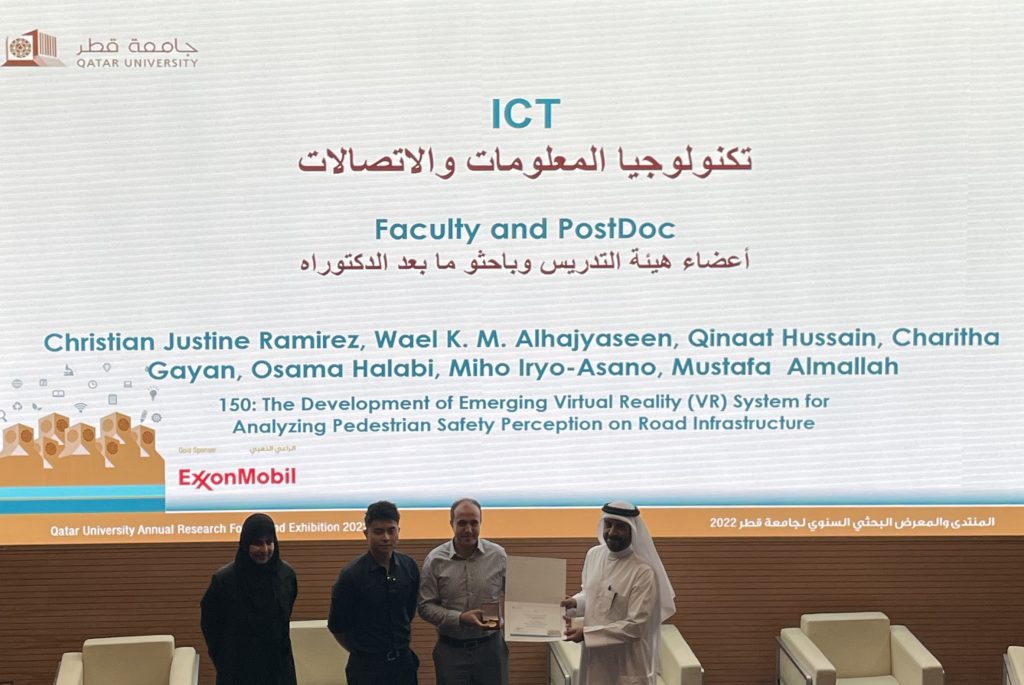
Our students Somaya Eltanbouly, Muraam Abdel-Ghani, and Hoda Helmy won the Best Poster Award in Information and Communications Technologies discipline for Undergraduate Students category. The project is titled “Assistive Telexistence System Using Motion Blending”, and supervised by Dr. Osama Halabi and Dr. Mohammed Al-Sada.
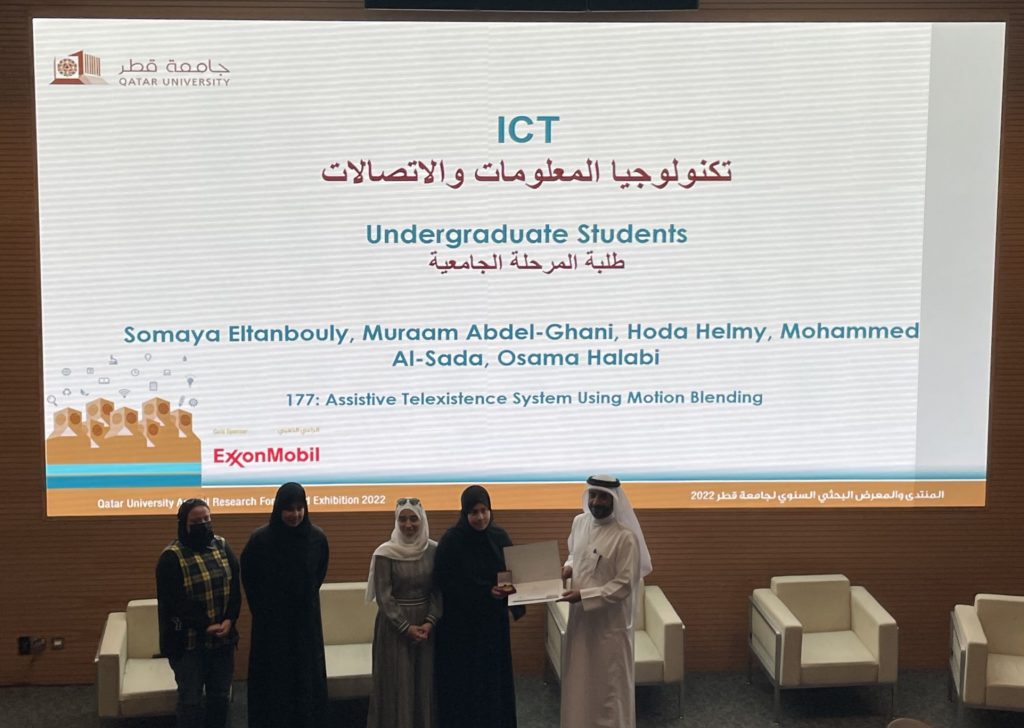
Our CSE graduate student Najmath Ottakath won the Best Poster in FIFA World Cup Related Research discipline for graduate students category with a project titled “Fan Rage Detection and Alert System in Football Stadiums Using Multi-surveillance System”. The project is supervised by Dr. Sumaya Al Maadeed.
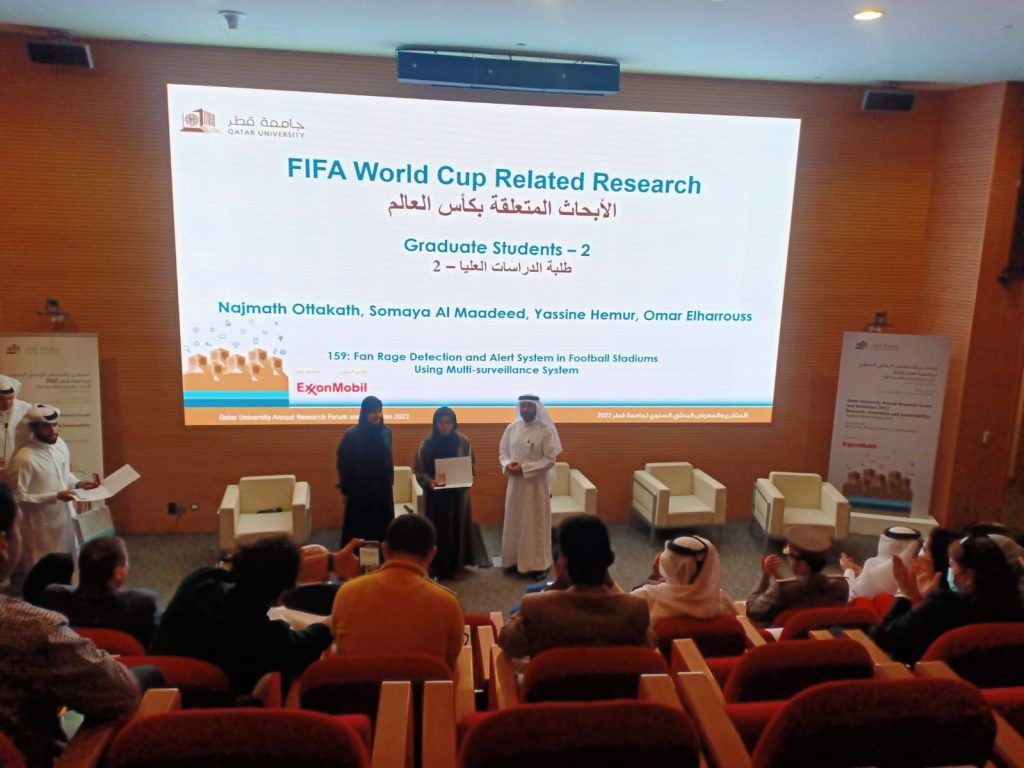
Congratulation to all of our winners!
August 15, 2022 / Leave a comment
A major cluster grant titled “The Future of Digital Citizenship in Qatar: A Socio-Technical Approach” from the Qatar National Research Fund (QRNF) was awarded to HBKU, Qatar University, and many other partners to lead a multi-entity, interdisciplinary project on digital citizenship in the Arab region.
The $3.8m four-year grant was awarded under QRNF’s National Priorities Research Program-Cluster (NPRP-C) and enables collaboration between 10 entities from academia and industry.

Dr. Raian Ali, Professor in Information and Computing Technology at HBKU, will lead the cluster as program director with six projects that will focus on building an observatory for trends and common topics on social media, web-based tools, educational materials, and research into digital literacy and well-being, gender equity, social inclusion, behavior-based approaches to security and safety, detecting and limiting propaganda and other areas.
Qatar University is leading two projects by Dr. Khaled Khan and Dr. Osama Halabi from the Computer Science and Engineering Department, College of Engineering.
The project led by Dr. Khaled Khan is titled ”Security and Safety as a Behavior”. It is a collaborative project between Qatar University, HBKU, and Bournemouth University. The project will research a behavior-based approach to security and safety. Investigate hacking and social engineering techniques that are successful in the Arab world and propose socio-technical approaches to enhance resilience to manipulators online and encourage reporting. The solutions are based on the approaches of behavior rehearsal, simulation, and social norms.
The project is led by Dr. Osama Halabi is titled “GESI by Design”. It is a collaborative project between Qatar University and HBKU. The project will study how to mitigate issues related to Gender Equality and Social Inclusion (GESI) in social media in Qatar and the Arab world and increase awareness of them. The team will use digital nudging techniques based on annotation and a bespoke set of reactions and emojis and devise tools to facilitate a structured dialogue. The aim is to encourage a more civilized and inclusive language and interaction.
The cluster is supported by a wide range of key stakeholders in Qatar including the Ministry of Communication and Information Technology, Qatar National Library, Msheireb Museums, Qatar Finance Centre, and Fadaat Media, who will provide facilities and enrich the knowledge transfer.
April 14, 2022 / Leave a comment
Our CSE department was awarded 2 National Priorities Research Project-Standard (NPRP-S) grants from Qatar National Research Fund (QNRF) in their 14th cycle. This cycle was so competitive that Qatar University was awarded only 14 projects; 5 of which are awarded to the College of Engineering. The two awarded projects are led by Dr. Tamer Elsayed and Dr. Abdulla Al-Ali.

The project led by Dr. Abdulla Al-Ali is titled “Defense Against Hardware Intrinsic Attacks in Resource-Constrained COTS based Traditional and Futuristic Artificial Intelligence of Things (AIoT).” It is a collaborative grant between QU and Tennessee Tech University in collaboration with the Ministry of Interior, Qatar. The PIs from QU are Dr. Abdelkarim Erradi and Dr. Uvais Qidwai, while the Tennessee Tech University PIs are Dr. Syed Rafay Hasan, Dr. Tarek Elfouly and Dr. Terry Guo. The project revolves around three main objects: (a) The development of hardware intrinsic security mechanisms for Resource Constrained (RC) Commercial off the shelf (COTS) based traditional IoT systems, (b) Investigating the vulnerability of hardware intrinsic security mechanisms for RC-COTS based futuristic AIoT system, and (c) developing a testbed implementation to examine real world scenarios to make the proposed work technology ready.

The project led by Dr. Tamer Elsayed is titled “Dimension-Specific Automated Scoring of Arabic Language Writing Proficiency“. The project’s team is entirely based in Qatar, having Dr. Houda Bouamor from CMU-Q and Dr. Walid Massoud from QU, with complementary expertise in Arabic natural language processing, information retrieval, applied machine learning, and psychometrics and standardized testing. The goal of the project is to build an automated scoring system for the quality of students’ writing abilities (on different aspects) in standard Arabic exams (similar to IELTS or TOEFL English exams). The proposed system, which is potentially the first of its kind in the Arab region, will potentially help in assessing the students’ writing proficiency in Arabic exams offered at QU as well as several high schools at Qatar Foundation. The project is funded for 3 years.
January 19, 2022 / Leave a comment


November 7, 2021 / Leave a comment

Dr. Tamer Elsayed has received a “Best Reviewer Award” at the 30th International Conference on Information on Information and Knowledge Management (CIKM) 2021. The award was announced during the conference that was held online last week. The award was given to 30 reviewers out of more than 1,600 reviewers, according to the General Chairs of the conference.
Congratulations Dr. Tamer for the recognition!
